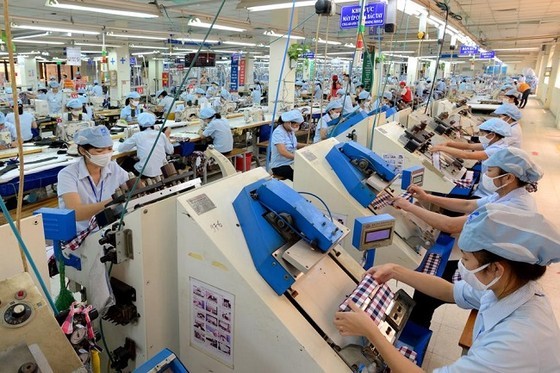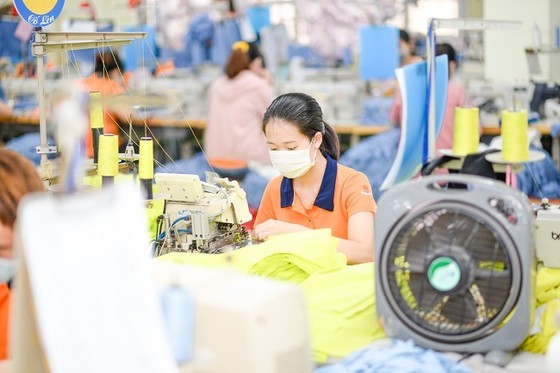 |
| The garment industry is facing some difficulties in export markets due to the economic downturn |
New difficulties pile up
According to the report of the Ministry of Industry and Trade on the implementation of the Resolution No. 01/NQ – CP to press agencies today, industrial production and commercial activities in the first 6 months of 2023, global economic uncertainty is at its highest level in many years, affecting macroeconomic stability and growth prospects of Vietnam as the country is a highly open economy. An open market is an economic system with little to no barriers to free-market activity.
The risk of economic recession and inflation causes a sharp drop in consumer demand in countries around the world, including the Europe-America region, which are major trading partners of Vietnam.
Worryingly, the trend of de-globalization and protectionism is emerging. Developed countries are increasingly concerned about consumer safety, sustainable development, and climate change, which will be the premise for them to set up new standards and regulations related to the supply chain, raw materials, labor, and environment for imported products such as the EU's anti-deforestation bill, or the EU's Carbon Border Adjustment Mechanism (CBAM).
Along with that, the trend of multinational corporations is implementing a strategy of shifting supply chains, bringing production closer to the consumption market and diversifying production supply chains instead of just focusing on manufacturing factories in some countries such as China and Vietnam. Multinational corporations are focusing on investing in production plants in a number of countries such as India, Mexico, and Brazil increasing their competitiveness in the main export markets of Vietnam and directly influencing Vietnam's market share in these markets.
Many opportunities still exist
 |
Opportunities are still open for the garment industry when the import tax into the EU is zero percent, according to the EVFTA commitment |
Despite such above-mentioned difficulties, there are still many opportunities open up. According to the Ministry of Industry and Trade, the FED's decision to keep interest rates unchanged at 5 percent - 5.25 percent in June 2023 reduces pressure on the domestic market. Because when the State Bank of Vietnam loosens monetary policy, supporting economic growth will have a positive impact on boosting production and consumption in the last months of the year.
The Ministry of Industry and Trade also said that the weak recovery of major economies such as the US and China over the past time has reduced oil prices in the world. At the same time, the reopening of China after the Covid-19 lockdowns will help increase opportunities for Vietnam to boost exports, investment and tourism.
Industrialized countries continue to promote the strategy of supply diversification, supply chain diversification and investment diversification (China +1), which will help Vietnam become an important manufacturing and export center in the global value chain.
Domestically, Vietnam still maintains macroeconomic and social stability in the context of complicated geopolitical and world economic fluctuations. Reputable international organizations continue to positively evaluate and forecast Vietnam's economic prospects in 2023 and in the future. Although Vietnam's economic growth slowed down, it remained positive in the second quarter and subsequent quarters of 2023.
Simultaneously, the Government is accelerating the disbursement of public investment in 2023, especially in the last months of the year to create breakthrough growth, which will have a positive impact on recovery and growth in a number of industries such as steel, construction materials, and mechanical engineering. The Ministry of Industry and Trade said that public investment disbursement would be an important driving force to boost Vietnam's economic growth in the coming time, helping to boost production and trade.
Many policies have been implemented to remove difficulties for production and business enterprises including policies in taxes and fees, which will help the business community promote production and business in the coming time.
For instance, the policy of social security and employment support rent, tax and charge exemptions such as VAT reduction for most items from 10 percent to 8 percent; or registration fees decrease of 50 percent for locally assembled and manufactured cars is also a solution to help businesses recover and develop.
Regarding exports, according to the Ministry of Industry and Trade, some apparel products begin to enjoy zero percent import tax when entering the EU market according to the commitments of the EVFTA Agreement, which has facilitated garment exports to this market.
























